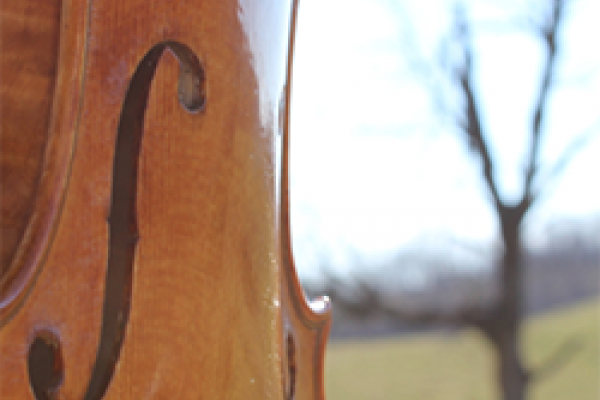
Guest speaker Jasper Waugh-Quasebarth, Center for Folklore Studies at Ohio State, presents a virtual lecture, "'Wolf Tones' and Meshworks: Listening for Frictions in Luthiery and Extractive Forestry," at 4 p.m. Eastern time.
This lecture is co-sponsored by the Center for Folklore Studies at the Ohio State University. Lectures in Musicology is co-sponsored by The Ohio State University Libraries.
Small-scale musical instrument makers in West Virginia pursue “singing,” lively instruments that capture ideals of musical tone and “re-enchant” their work and lives through relationships with craft materials and the forest landscape. The main suitable tonewood for instrument tops in Appalachia, red spruce (Picea rubens), intersects with makers’ desires to craft instruments in the style of famed makers as well as provide instruments imbued with a sense of place. While the demand for and symbolic import of instruments made with local wood seems to grow, the availability of the requisite tree species is dominated by resource materialities and temporalities of large landowners and timber producers. In order to continue practicing their craft, makers navigate “meshworks” (Ingold 2011) of forest environments and the global exchange of sonic craft materials. Attention to the simultaneous reliance upon and resistance to extractive methods can be conceptualized as “wolf tones” that bring attention to the central paradoxes of musical instrument making as well as provide a needed attention to power and political economy to the conceptual model of "meshworks."

Jasper Waugh-Quasebarth is the Public Folklorist and Postdoctoral Scholar at the Center for Folklore Studies at The Ohio State University. He currently teaches the Ohio Field School course and coordinates the Sharing Visions Project. He has researched musical and material craft traditions in global contexts through his work with the Smithsonian Institution’s Asian Cultural History Program and the University of Kentucky Department of Anthropology and Appalachian Center, where he earned his PhD in 2019. His recent research interests have involved craft economies and production in global mountain forests, with a focus on Carpathia and Appalachia and collaborative methods. His upcoming book, Finding the Singing Spruce explores the connections between the meaning of craft work and forest environments in the craft of musical instruments in West Virginia.
Attendance is free, but online registration is required. Registered participants will receive an email with the Zoom meeting link.
REGISTER
Visit Musicology Events
